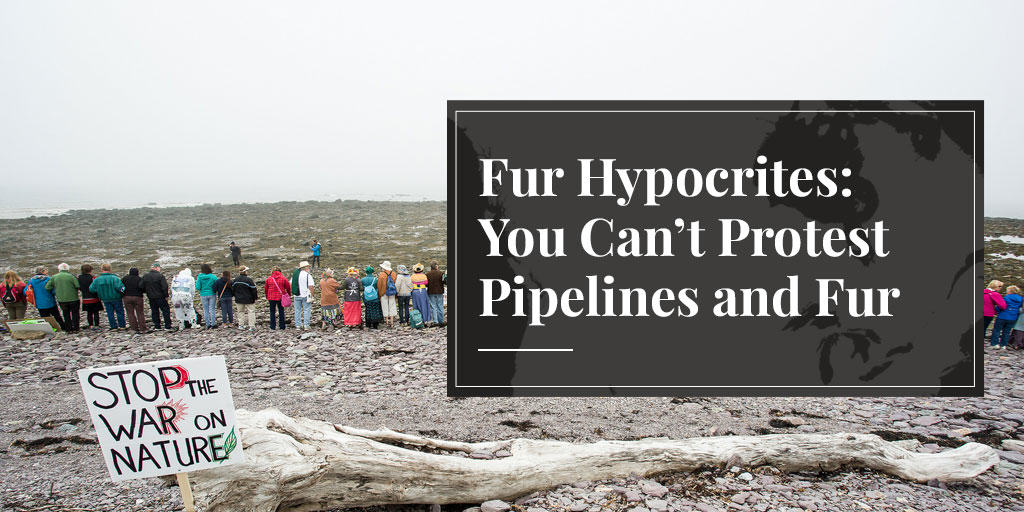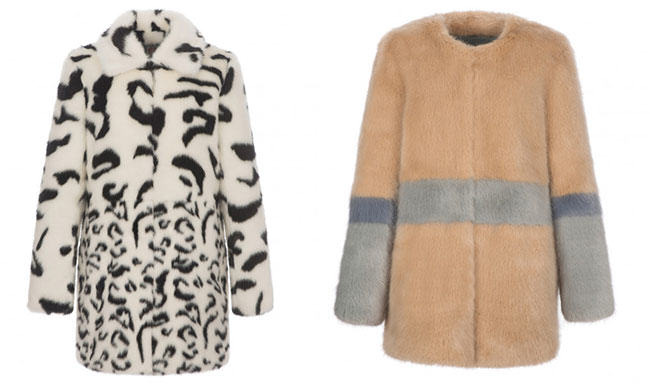
In the fur trade we see all kinds of hypocrisy from our critics, and one that we see regularly is people who protest pipelines and also protest fur.
If you live in a country that has a real winter, you’ll need winter clothing for survival. There are really only two types of material suitable for winter clothing: animal based materials (such as fur, leather, shearling, wool, and cashmere) and synthetics. Anyone who is against fur is presumably against the use of other animal materials (if not, you are really not thinking very clearly, but that’s a story for another day), but anyone who is against pipelines should presumably be against synthetics, because most synthetics are made from petroleum by-products.

So why do we constantly hear the animal activists touting the benefits of fake fur as an alternative to the real thing? That’s a question we just can’t answer. We frequently run across anti-fur folk who promote synthetic alternatives, yet are against pipelines. Maybe someone needs to tell them that those pipelines are needed to produce the plastic clothing they want us all to wear. Most people protest pipelines because they want to protect pristine nature. So wouldn’t it make sense that these people would also be against wearing clothing made from petroleum by-products, which, we are now learning, pollutes our air and water with micro-particles of plastic when washed, and then sits in a landfill for a thousand years when discarded?
SEE ALSO: Hypocrite profile: Stella McCartney
We are in a fragile situation right now on the planet – rising temperatures, oceans accumulating plastic, and a dependence on non-renewable energy. A life without fossil fuels in the near future is going to be close to impossible, but we should be looking at reducing our consumption of them. Petroleum is not easy to extract, it’s not good for the environment, and it is not renewable. Solar power, wind farms, and electric cars are all helping us move away from the use of petroleum, but this will take time. Meanwhile, though it is hard to give up on gas or certain plastics, we can easily reduce our consumption of some petroleum-based products: notably, single-use plastics (water bottles – I’m talking to you) and synthetic clothing.

Yet we hardly hear about reduction of synthetic fibres as a viable way to reduce our dependence on petroleum products and the pollution these materials cause. And this is surprising – given that there are many animal and plant-based alternatives to synthetic fabrics that are as viable and useful as synthetics. No fabric is perfect, and everything requires energy to produce, but the materials that are sustainable, long-lasting, and biodegradable should always be the first choice. Imagine how dramatically our consumption of plastic clothing would decrease if we all pledged to wear clothing items for five years instead of one. Not only would we buy less, but we would probably buy better quality (and therefore less synthetics) in order to ensure that the garments lasted longer.
SEE ALSO: Hypocrite profile: Ricky Gervais
It’s easier to choose a leather shoe over a synthetic one, than it is to find an airline that will fly you to your holiday destination in an electric plane. And while the effect of plastic clothing may not be the most hurtful to the environment (compared with cars and industrial pollution), the damage is nonetheless scary. Microplastic particles are now being found in our food, water, and air – and the culprit is often synthetic clothing. Next time you eat an oyster burger washed down with a pint of your favourite local ale, keep in mind that you are getting a side dish of plastic particles, free of charge.

It doesn’t make sense to protest pipelines and be against the use of animal products in clothing. If you are concerned about the planet and our consumption, then by all means let’s try and reduce our dependence on fossil fuels and let’s encourage more renewable forms of energy. But if that’s your stance, then your wardrobe had better reflect that as well. If you are aiming to live an environmentally conscious life, then your wardrobe should include clothing made from plant-based materials and animal products, produced sustainably and ethically, made to last, and when they find themselves ready for the landfill, your wardrobe should biodegrade and return into the cycle of nature.
SEE ALSO: Hypocrite profile: Pink
But if you choose to protest pipelines while wearing synthetic clothing made from petroleum co-products, you may find yourself in a conflicting position (read: you are a hypocrite.) Fur is a natural, renewable resource and fur clothing is warm, long lasting, and biodegradable. A synthetic fleece jacket made from petroleum co-products releases plastic particles into the water and the air every time you wash and dry it, and will end up in a landfill for thousands of years, never able to fully biodegrade. How many 30-year-old fleece jackets do you find being handed down from one generation to the next? Not many. But you might find me on my way to protest pipelines wearing the 40-year-old muskrat coat my grandmother gave me a few years ago.











The stance taken by vegans who are also against pipelines is not hypocritical. It is merely reflective of an ethical dilemma. There are many ethical dilemmas faced by people in our complex world and this is just one of them. There may be no resolution yet, but we can still try working towards one. It is easier for me to avoid synthetics as well as leather and fur because here in SE Australia we have such a temperate climate than it is for some others. I also believe in reduction when abolition is not currently possible. Your article raises two competing concerns. Being concerned about both does not amount to hypocrisy. It shows awareness of the ethical questions facing the human race today.
You are correct that some people are able to avoid both synthetics and animal materials and that makes them an exception to this rule. But the anti-fur movement has always touted synthetic replacements, and promoting the alongside environmental concerns is contradictory. The world is changing, and our beliefs need to adapt. You might not like the idea of killing an animal to make a coat but if you care about the environment then you need to be open-minded about these issues. It is better to use a renewable resource that is biodegradable (and often local) to make a garment, than it is to use a petroleum derivative that will pollute while it is being used and when it sits in a landfill. And for as long as people will need winter clothing (which, let’s face it, may not be for that much longer if we don’t change our ways) we will always be faced with the dilemma of animal product or synthetic? And animal product is better.
Also, if you believe in reduction (which the writer appears to promote, too) then fur is most definitely preferable over synthetics. It lasts longer and has the ability to be remodeled. No fleece jacket can say the same.